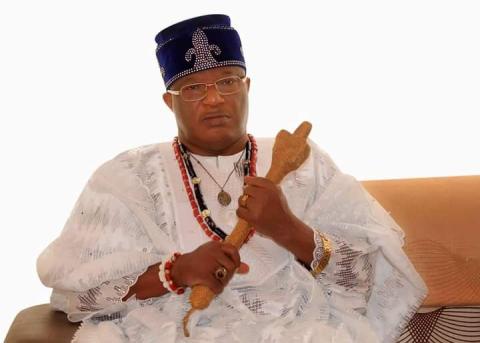
Breaking News: Unilorin Alumi Association: 'We were warned' - Opinion
Breaking News: Breaking: Court Restrains Oyo Assembly from Further Impeachment Process Against Makinde’s Deputy, Olaniyan
Breaking News: Labour leaders physically assault Ogun journalists for covering strike, harass hospital workers
Breaking News: Congratulations Asiwaju – Osinbajo’s spokesperson accepts defeat
Breaking News: Finalissima: Messi steals show, beats European Champion, Italy
Shopping for a head of Nigeria's prime anti-graft agency, the Economic and Financial Crimes Commission (EFCC) is almost becoming an exercise in controversy as the last three attempts have shown.
On Thursday, October 12, 2023, President Bola Ahmed Tinubu stepped into the muddy waters with appointment of Olanipekun Olukoyede, as the Chairman of the Commission.
Exercising his power under section 2 (3) of the Economic and Financial Crimes Commission, EFCC, establishment Act, 2004 (As amended), President Tinubu said he was tapping Olukoyede, a former Secretary to the Commission to take over from the detained AbdulRasheed Bawa. Ironically, Bawa's resignation would not come from the detained man himself but from the presidency, same day as Olukoyede's nomination for his position was announced.
Olukoyede, a Southerner and Christian is seen as breaking the string of successive Northern muslim heads - Nuhu Ribadu (2003 - 2007), Farida Waziri (2008 - 2011) and the only female; Ibrahim Lamorde (2012 - 2015), Ibrahim Magu, in acting capacity (2015 - 2020), and AbdulRasheed Bawa (2021 – 2023). The ethno-religious debate seems to have even undermined by the legal provisions of who can head the agency.
According to Section 2 (ii) (iii) of the EFCC establishment Act, the chairman of the commission who shall be the Chief Executive and Accounting Officer of the Commission, must “be a serving or retired member of any government security or law enforcement agency not below the rank of Assistant Commissioner of Police or equivalent; and, possess not less than 15 years cognate experience.”
Olukoyede, government in his official statement said, is eminently qualified for the position. Like Bawa, he had also been an EFCC insider. His first experience was as the chief of staff to the former Chairman of the Commission, Magu, between 2016 and 2018. The two-year stint was followed by serving as the Secretary of the Commission, for five years, between 2018 and 2020 or 2023 as contained in the statement. Put together, the two- and five-years’ experience (using the government calculation) gave seven years of cognate experience in more of administrative rather than the operational arm that are key functions of the anti-corruption agency.
Olukoyede, however, has had ad hoc engagements in the fight against financial crimes apart from his legal qualifications. For 22 years, he has been a regulatory compliance consultant and specialist in fraud management and corporate intelligence though in private practice. Added to this is his membership of the Federal Government Technical Committee on the Repositioning of the Nigerian Financial Intelligence Unit.
Two or three impeding hurdles stirring the controversy over nomination is the section of the EFCC law that says the head of the Agency must be "a serving or retired member of any government security or law enforcement agency not below the rank of Assistant Commissioner of Police or equivalent; and, possess not less than 15 years cognate experience.” The provisions explicitly doesn't seem to make or grant exceptions. They are the hurdles against Olukoyede.
Apart from his first stint with the Commission as the Chief of staff to Magu for just two years, Olukoyede's service as Secretary of the Commission from 2018 – 2020 was terminated by former President Muhammadu Buhari alongside Magu. He, too, like his chairman was never recalled to office.
Granted that Olukoyede is a former member of EFCC, how the rank of Assistance Commissioner of Police is measured in the two capacities he has served, for a man who has largely be in private practice remains a question that the Senate would be expected to be trashed during the screening exercise.
The equivalence of an Assistant Commissioner of Police is an alternate provision that must be understood within the letters of the provision, and how this is measured in terms of Olukoyede’s experience in the private practice or stint with the EFCC, is another question begging for answers.
The 15- year cognate experience is a major condition that needs to be put in perspective in the nomination of Olukoyede. And the question is ‘cognate experience at where’, public or private sector or both interchangeably?
As an EFCC operative? Definitely not. All former Chairmen of the Commission, except Bawa, had their experiences in the Nigeria Police and not in the EFCC.
Another possible interpretation of the 15-year cognate experience in the Act, is experience in private practice. Could experience in private practice, since it was not explicitly clarified, in any discipline, for example, 30 years as a teacher of Yoruba Language, be the intention of the framers of the law? Can this be said to be enough for nomination as head of the agency? The legal brickbats bound to ensue would untangle some of these questions.
The Senior Special Adviser to the President on Public Engagement, Frederick Nwabufo, argues, for instance that the EFCC Act did not state the nature of the experience which a person is required to possess, implying that the experience is presumed to be the work or function of the EFCC, ‘acquired anywhere’.
He said, “This implies that such cognate experience is presumed to be that of the work or functions of the EFCC, acquired anywhere since the EFCC Act did not state the specific place where it must be acquired," he said.
Not everybody shares the interpretation. A human rights lawyer and former Chairman, Nigeria Bar Association, Ikeja branch Dr Monday Ubani, believes the buck stops at the Senate, peopled by qualified lawyers, including the leadership.
He said, “Ask yourself, has he been a worker of any of the government security agencies? That is one. Has he put in up t0 15 years, because the law say he must have put up to 15 years in that government security agency, very important; and that person must be at the level of an Assistant Commissioner of Police, or its equivalent.
“If we itemize these things and the government says he has put up to 15 years in any of the government security agencies and that even if you look at his position, it is an equivalent of an assistant commissioner of police, if he meets up with that requirement, the senate will look at these provisions of the law critically and see if there’s satisfactory compliance by the government, they can give him clearance and if he is not, they can point it out.”
Can the Senate honestly apply the rules in the book in the screening of the nominee? Can it be trusted to do the right thing? Time will tell. But one thing is very clear in all of these, the need for the law to be reviewed for clarity.
Newsletter






We are not gonna make spamming
Copyright By @ HorizonTimes - 2026
BACK TO TOP